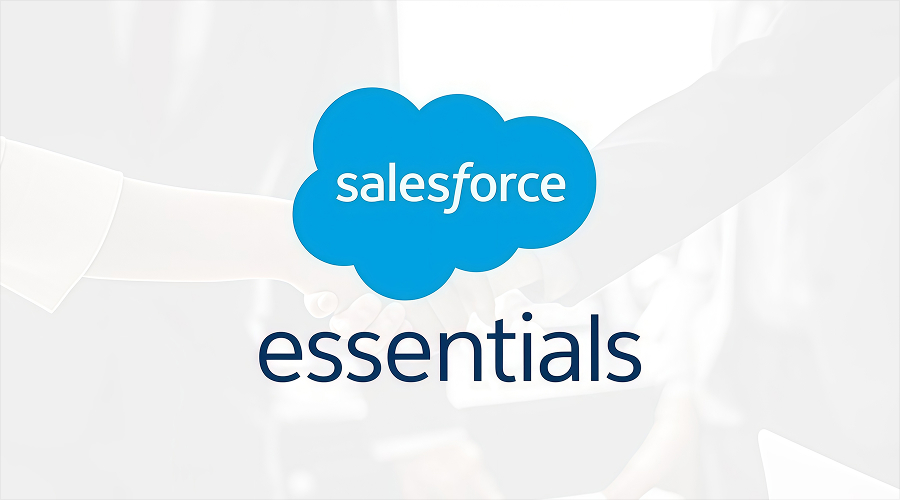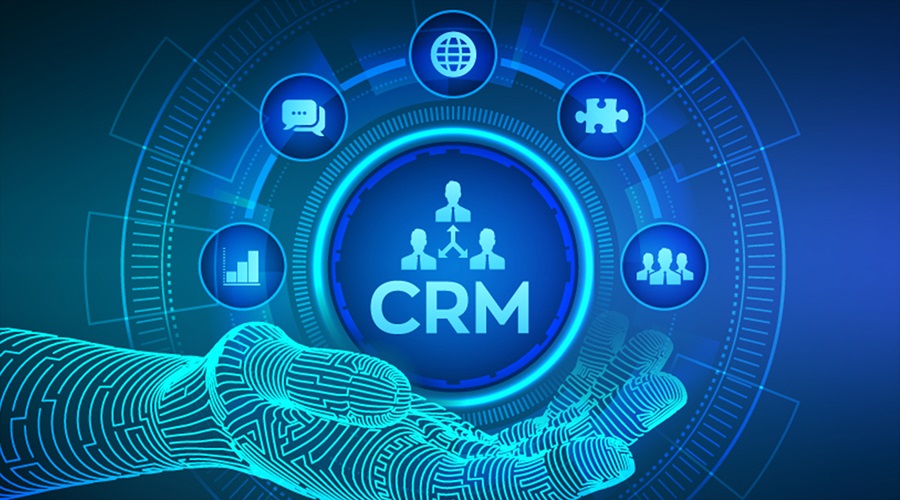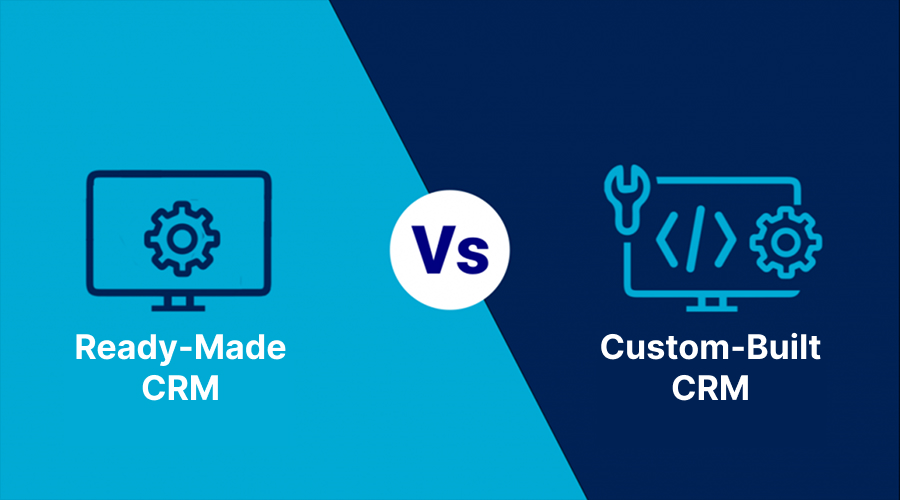
Small and medium sized businesses (SMEs) need Customer Relationship Management (CRM) software in order to optimize customer interactions, monitor sales opportunities and deliver superior service. In the competitive business environment of today, SME CRM solutions are no longer optional tools but crucial systems that can make or break a business.
Customer relationship management technology allows businesses to centralize customer data, automate repetitive tasks and gain insights into their sales processes. With the right CRM system the SMEs can streamline their sales activities, enhance customer satisfaction and empower their teams to close deals more effectively. The benefits of CRM software go beyond basic contact management by offering features such as lead scoring, automated follow ups and detailed analytics that inform strategic decision making.
When considering Top 5 CRM Software Solutions for SMEs (and When to Build Custom), you have an important decision to make. Should you choose a pre existing solution that can be implemented quickly and has proven functionality or should you invest in a custom built system designed specifically for your business? Off the shelf CRM products provide quick installation and continuous vendor support while custom solutions give you full control of functionality and data security. Knowing this distinction will enable you to make an educated decision that best complements your business goals, budget constraints and growth strategy.
Understanding SME CRM Requirements

Small and medium enterprises have distinct SME CRM requirements that differ significantly from larger corporations. You need a system that addresses your specific operational constraints while delivering maximum value for your investment.
➢ Essential Small Business CRM Features
Ease of use stands as the most critical factor for SME success. Your team does not have extensive training budgets or dedicated IT departments to manage complex systems. You require intuitive interfaces that allow immediate productivity without steep learning curves.
Integration capabilities determine how well your CRM connects with existing tools:
● Accounting software like QuickBooks or Xero
● Email marketing platforms
● E-commerce systems
● Social media management tools
Mobile access has become non negotiable for modern SMEs. Your sales representatives work remotely and attend client meetings and need real time data access from various devices. A robust mobile app ensures your team stays connected regardless of location.
➢ Scalability and Budget Considerations
CRM scalability directly impacts your long term success. You need solutions that grow with your business without requiring complete system overhauls. Pricing structures should accommodate your current team size while offering reasonable upgrade paths as you expand.
➢ The Cost of Operating Without CRM
SMEs without proper customer relationship management face significant challenges:
- Lost leads due to poor follow-up tracking
- Inconsistent customer communications
- Difficulty identifying sales patterns and opportunities
- Manual data entry consuming valuable time
- Lack of customer history during support interactions
These operational gaps directly impact revenue growth and customer satisfaction, making CRM investment essential rather than optional.
1. Salesforce Essentials

It is the small business edition of the world’s leading CRM platform, designed specifically for growing companies. It simplifies the complexity of enterprise level CRM systems while still offering the powerful features that made Salesforce an industry leader.
The platform provides customized sales, marketing and service tools that work seamlessly together. You can easily manage contacts and accounts automatically capture customer interactions across multiple channels and visually track deals from initial contact to closing with the sales pipeline management system.
Key features include:
● Lead and opportunity management with automated scoring and routing
● Email integration that syncs with Gmail and Outlook for seamless communication tracking
● Mobile app functionality allowing your team to access customer data and update records on the go
● Customizable dashboards providing real time insights into sales performance and customer metrics
● Marketing automation tools for email campaigns and lead nurturing sequences
● Customer service capabilities including case management and knowledge base integration
The strength of the platform lies in its ability to grow with your business. You can start with basic contact management and gradually add more advanced features like workflow automation and reporting as your needs change. It integrates with over 3,000 third party applications through the AppExchange marketplace by ensuring that you can connect your existing business tools without disrupting established workflows.
Price begins at $25 per user monthly that keeps it affordable for small teams yet provides enterprise grade reliability and security necessary for larger organizations.
2. Pipedrive
This stands out among the best CRM for SMEs with its intuitive design that transforms complex sales processes into manageable visual workflows. This platform from Estonia has earned its reputation by focusing on what sales teams actually need a clear, actionable view of their pipeline that does not require extensive training to master.
The platform’s signature visual sales pipeline presents your deals as cards moving through customizable stages by making it instantly clear where each opportunity stands.
You can drag and drop deals between stages, set up automated actions for specific pipeline movements and create custom fields that capture the unique data points your business requires. This visual approach eliminates the confusion that often plagues traditional CRM interfaces.
It’s mobile capabilities deserve special recognition. The mobile app delivers full CRM functionality without compromise, allowing your sales team to update deal information, schedule follow ups and access customer data whether they are in the office or meeting clients across town. The app syncs seamlessly with the desktop version by ensuring your team always works with current information.
Customizable workflows extend beyond the pipeline view. You can automate routine tasks like sending follow up emails, creating activities based on deal progression and generating reports. The platform integrates with over 400 third party applications, including popular accounting software, email marketing tools and communication platforms that SMEs commonly use.
3. ConvergeHub
It is a budget friendly CRM solution that offers extensive features without the high cost. This cloud based platform combines sales automation, marketing tools and customer service capabilities into one integrated system by making it ideal for small businesses looking for a complete solution.
Key Features of ConvergeHub
1. Lead Scoring: Automatically rank prospects based on their engagement levels, website behavior and interaction history to prioritize sales efforts effectively.
2. Social Media Branding Strategy: Monitor social conversations, track brand mentions, and engage with prospects directly from the platform to build brand presence and nurture relationships.
3. Unified Customer Data View: Consolidate all customer touchpoints for a comprehensive understanding of each client.
4. Email Marketing Campaigns: Create and send personalized email campaigns with customizable templates.
5. Advanced Analytics: Gain insights into customer behavior and make data-driven decisions for your business.
6. Mobile App: Access critical customer information on-the-go with the mobile application.
The pricing structure makes it accessible for growing businesses, typically offering more features per dollar compared to enterprise focused alternatives like Salesforce Essentials.
4. Monday Sales CRM
This CRM makes sophisticated sales management an easy-to-use visual journey that SMEs can learn in a matter of minutes. This platform ranks among the top CRM for SMEs by allowing an unlimited number of customizable boards that fit any sales process, so it is just as useful for small teams and expanding businesses.
The system’s built in dashboards are customizable and are used as command centers where you can track all aspects of your sales pipeline. You have real time visibility into deal advancement, team performance and revenue forecasting through interactive widgets that update themselves as your team makes progress.
Data visualization tools represent Monday Sales CRM’s strongest asset. The platform converts raw sales data into compelling visual formats:
● Pipeline views that display deals as cards moving through customizable stages
● Gantt charts for tracking project-based sales with timeline dependencies
● Kanban boards that organize leads and opportunities by priority or status
● Calendar integration showing all sales activities and follow-ups in one view
The mobile app ensures your sales team stays connected whether they are in the office or meeting clients. You can update deal statuses, log activities and access customer information from any device.
It excels at handling intricate sales workflows that involve multiple stakeholders, approval processes or lengthy sales cycles. The platform’s automation capabilities eliminate repetitive tasks while maintaining the flexibility that growing businesses need to adapt their processes as they scale.
5. NetSuite
It is among the best CRM for SMEs as it provides an end-to-end cloud based Enterprise Resource Planning (ERP) solution with robust CRM capabilities. In contrast to other CRM solutions that are concerned only with customer relationships, NetSuite offers a full suite of tools for running all facets of your business, such as finances, inventory and ecommerce.
This combined functionality makes it particularly worthwhile for expanding companies that need more than simple contact management. With NetSuite, you have one platform in which the sales data automatically feeds into financial reporting, inventory quantities update in real-time depending on customer orders and customer service teams can view full histories of transactions without needing to toggle between multiple system.
Key features that make NetSuite stand out for SMEs:
● Real-time business intelligence: Customizable dashboards provide a holistic view of all business operations.
● Advanced lead-to-cash automation: Streamlines the entire sales process from initial contact to revenue recognition.
● Multi-channel customer support: Tracks interactions across email, phone, chat, and social media.
● Scalable architecture: Grows with your business, accommodating everything from basic contact management to complex multi-subsidiary operations.
● Built-in e-commerce integration: Synchronizes online sales with CRM data and inventory management.
The platform’s strength lies in eliminating data silos that many SMEs face when using separate systems for accounting, inventory and customer management. By choosing NetSuite, you are investing in a solution that can support your business transformation from startup to enterprise level operations.
Other CRMs to Consider
There are other CRMs worth considering, especially if you are looking for advanced AI features and automation capabilities.
- Freshsales AI CRM stands out with its intelligent assistant, Freddy, which provides predictive insights and automates routine tasks. You will benefit from AI powered lead scoring, deal predictions and personalized email recommendations that help your sales team focus on high value opportunities.
- HubSpot Operations Hub excels in creating seamless workflows between your existing tools. This platform connects your marketing, sales and service data through powerful automation features. You can synchronize customer information across multiple systems while maintaining data quality through automated cleansing and formatting.
- Zoho CRM AI features bring sophisticated analytics to small business budgets. The platform’s Zia AI assistant offers sales forecasting, anomaly detection and intelligent recommendations. You will appreciate the gamification elements that motivate your team through achievement badges and performance leaderboards.
These solutions provide enterprise level intelligence without the complexity, making advanced CRM capabilities accessible for growing SMEs that need more than basic contact management.
When to Consider Building a Custom CRM Solution

While ready-made solutions dominate the market, custom CRM development becomes essential when your business operates beyond conventional boundaries. You’ll find yourself evaluating this path when standard platforms simply cannot accommodate your unique operational requirements.
➢ Unique Business Process Requirements
Your industry may demand tailored workflows that commercial CRMs cannot replicate. Manufacturing companies with complex multi stage approval processes, consulting firms managing intricate project lifecycles or specialized service providers with unique customer journey mapping often discover that off the shelf solutions force them to compromise their proven methodologies. Custom development allows you to preserve these competitive advantages while gaining digital efficiency.
➢ Complex Integration Demands
Integration complexity extends far beyond basic API connections. You might need real time data synchronization with proprietary systems, legacy database connectivity or specialized third party tools that lack standard connectors. When your business relies on multiple specialized software platforms that must communicate seamlessly, custom CRM development provides the flexibility to create these connections without workarounds or data silos.
➢ Security and Compliance Control
Businesses dealing with sensitive data require strict data security compliance standards that might not be fully satisfied by commercial platforms. Healthcare organizations dealing with HIPAA compliance, financial institutions meeting SOX regulatory or government contractors having specific security clearances often require full access to data handling, storage and access procedures.
Custom solutions give you complete control of security implementations, which can help you achieve precise regulatory requirements without relying on third party vendors’ compliance certifications or policy updates that may affect your business.
Comparing Ready-Made vs. Custom-Built CRMs for SMEs

When CRM solutions, its important to understand the pros and cons of each option. This comparison will help you determine which approach is best for your small or medium sized enterprise.
➢ Advantages of Ready-Made CRMs
Ready-made CRMs offer several benefits that can be appealing to SMEs:
● Quick implementation: With pre-built features and templates, ready-made CRMs can be set up and launched within days or weeks.
● Ongoing vendor support: You can rely on the CRM provider for assistance with updates, security patches, and technical issues.
● Predictable costs: The pricing structure of ready-made CRMs is usually transparent, allowing you to budget for monthly expenses.
● Proven effectiveness: These solutions have been tested by numerous businesses, ensuring their functionality.
● Seamless integrations: Ready made CRMs often come with built-in integrations for popular business tools and platforms.
➢ Advantages of Custom-Built CRMs
Custom-built CRMs also have their own advantages that may suit certain SMEs:
● Tailored workflows: Custom solutions can be designed to perfectly align with your unique business processes.
● Flexible customization: You have the freedom to customize the CRM according to specific industry requirements.
● Data ownership: With a custom CRM you have complete control over your data and security protocols.
● No per-user fees: After the initial development investment, there are no additional licensing fees based on the number of users.
● Competitive edge: Specialized features in your custom CRM can give you an advantage over competitors.
➢ Key Factors for SMEs to Consider
As an SME, there are a few key factors you should consider when choosing between ready made and custom built CRMs:
1. Support vs maintenance: Ready made solutions offer dedicated support teams and regular updates while custom systems require internal IT resources or ongoing developer relationships for maintenance.
2. Cost implications: Ready made CRMs may seem more affordable initially with predictable monthly expenses but costs can accumulate over time. Custom solutions require significant upfront investment but eliminate recurring licensing fees as your team grows.
3. Scalability challenges: Ready made platforms typically have tiered pricing plans to accommodate business expansion, while custom systems may require additional development investment to handle increased user loads or add new features.
Ultimately, the decision between ready made and custom CRM solutions depends on your specific business needs available technical resources, and long term growth strategy.
Conclusion
Choosing the best CRM strategy involves carefully evaluating your specific business needs, growth plans, and available resources. The five CRM solutions we’ve discussed Salesforce Essentials, Pipedrive, ConvergeHub, Monday Sales CRM, and NetSuite each have their own advantages for different business situations.
When deciding between off-the-shelf solutions and custom builds, its important to find a balance between cost and customization. Off the shelf platforms can be implemented quickly and have proven features, while custom solutions offer tailored workflows but come with higher development costs. You need to determine if your business processes truly require unique features that commercial platforms do not offer.
To ensure your customer management system can grow with your business, consider the following factors:
● Current team size and projected growth
● Integration requirements with existing tools
● Budget constraints and ROI expectations
● Technical expertise within your organization
Your choice of CRM will have a significant impact on customer relationships, sales efficiency, and business growth. Take the time to try out multiple platforms, involve key stakeholders in the decision making process and prioritize solutions that align with your long-term business goals rather than just immediate needs.






